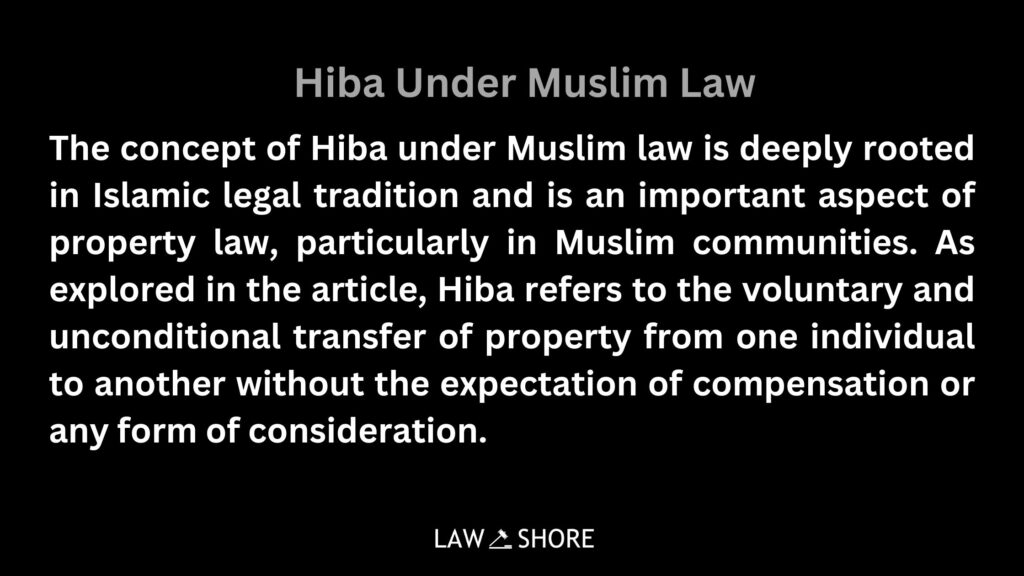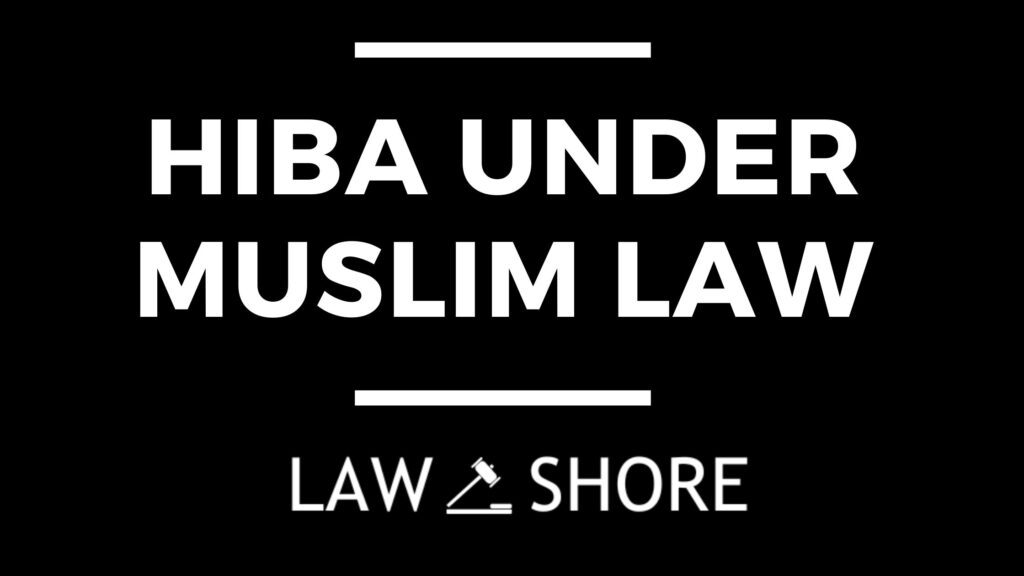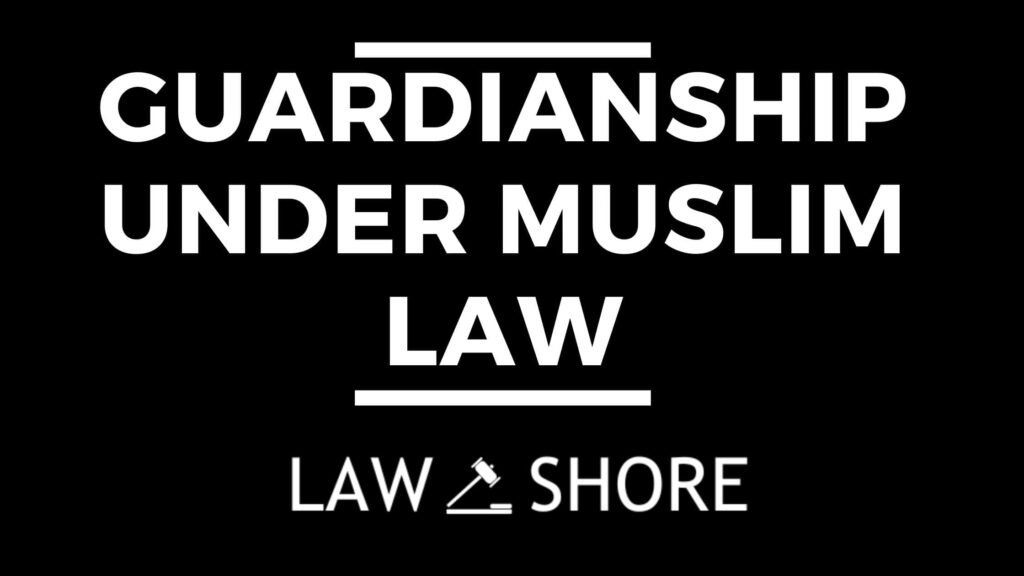Hiba Under Muslim Law in India
Table of Contents
ToggleThe concept of Hiba under Muslim law is deeply rooted in Islamic legal tradition and is an important aspect of property law, particularly in Muslim communities. As explored in the article, Hiba refers to the voluntary and unconditional transfer of property from one individual (the donor) to another (the donee) without the expectation of compensation or any form of consideration. Below, we will elaborate further on various aspects of Hiba under Muslim law in India, expanding on its significance, historical development, the requirements for a valid Hiba, and its legal implications.

Hiba in Islamic Jurisprudence
The concept of Hiba finds its origins in the Quran and Hadith, which emphasize charity, generosity, and promoting good relationships among people. Hiba, in its most basic form, is seen as an act of voluntary giving, rooted in the Islamic values of compassion, generosity, and social justice. While Hiba under Muslim law is distinct from inheritance (which follows specific rules of distribution in Islamic law), it shares the same general principle of wealth distribution for the benefit of others.
In the Quran, giving is extolled as a virtuous act. Surah Al-Baqarah (2:177), for example, encourages believers to give freely to those in need, especially to family members, orphans, traveller’s, and others deserving of charity. Similarly, in the Hadith, the Prophet Muhammad (peace be upon him) reinforced the importance of gift-giving to foster love and strengthen social bonds: “Give gifts, for gifts increase love between people” (Sahih Muslim).
Meaning of Hiba Under Muslim Law
The term Hiba is derived from the Arabic word meaning “to give” or “to donate.” In the context of Islamic law, Hiba refers to a voluntary and gratuitous transfer of property or rights from one person (the donor) to another (the donee) without any exchange of value or consideration. The gift can pertain to both movable and immovable property. Importantly, Hiba under Muslim law is unilateral in nature—it involves only the intention and action of the donor, and no reciprocal obligation exists for the donee to return the favor.
Once a Hiba is made and the gift is accepted, the donor loses all rights over the property, and the donee becomes the full owner. However, the transfer must be accompanied by the delivery of possession for it to be legally valid. If possession is not delivered, the Hiba may be incomplete or invalid.
Essence of Hiba Under Muslim Law
The core feature of Hiba is that it is voluntary, unilateral, and unconditional. The transfer of property is made by the donor without any coercion or expectation of return. Importantly, once a gift is made, the donor relinquishes all rights to the property, and the donee gains full ownership.
For Hiba to be valid, several essential features must be met:
- Voluntary and Unconditional: The gift must be made willingly, without any pressure, and there should be no strings attached. The donor does not expect anything in return, and the gift cannot involve any form of consideration.
- Transfer of Ownership: The donor must completely relinquish ownership of the property, and the donee must gain full ownership.
- Acceptance by the Donee: For the gift to be valid, the donee must accept the gift. Acceptance can be either explicit (verbal or written) or implicit (e.g., by taking possession of the gift).
- Delivery of Possession: For the gift to be legally binding, the donor must deliver possession of the gifted property to the donee. This is particularly important in the case of immovable property, where possession may be symbolically transferred through acts such as handing over keys or documents.
- Competence of the Parties: Both the donor and the donee must be legally competent. For example, minors or individuals of unsound mind cannot gift or receive property under Muslim law.
Parties Involved in a Hiba Under Muslim Law
In a typical Hiba transaction, there are two primary parties involved:
- The Donor (Wahib): The person making the gift must be of sound mind and legal capacity to transfer the property. The donor’s intention to make a gift is crucial for the validity of the transaction.
- The Donee (Maqbool): The person receiving the gift must also be legally competent, meaning they must not be a minor or of unsound mind. The donee must accept the gift, either explicitly or implicitly (through possession).
- Witnesses: Although not strictly required by Islamic law, witnesses often play a critical role in documenting the validity of a Hiba, especially when immovable property is involved.
Key Judicial Decisions on Hiba
Several key cases have helped shape the legal framework for Hiba under Muslim law in India:
- Muhammad Ali v. Shaista Begum (1941): This case highlighted the essential elements for a valid Hiba—clear intention of the donor, acceptance by the donee, and delivery of possession. It reinforced the principle that if possession is not delivered, the gift remains incomplete.
- M. C. Verghese v. T. C. Chacko (1954): This case distinguished between Hiba and a sale transaction. The court emphasized that a gift under Muslim law is unconditional, voluntary, and without consideration, whereas a sale involves a contract and exchange of value.
- Mansur Ahmed v. Haseena Begum (1967): The court reiterated that for a Hiba to be valid, there must be clear intention from the donor, acceptance by the donee, and delivery of possession. This case also clarified that Hiba cannot pertain to property that the donor does not own at the time of the gift.
- M.R. Pratibha v. T.S. Aftab (2002): This Supreme Court ruling clarified that while a gift of movable property under Muslim law does not require formal registration, immovable property must comply with the Indian Registration Act to be valid. It highlighted the legal nuances around gifting immovable property in India.
- K.K. Verma v. U.P. Shia Central Waqf Board (2016): This landmark case confirmed that under Muslim law, possession is the key element for completing a Hiba, especially for immovable property. The court clarified that registration of the gift deed is not mandatory unless possession has been delivered.
Distinguishing Hiba From Mushaa
One important distinction is between Hiba and Mushaa, both of which relate to property ownership but in different ways.
- Hiba involves the complete transfer of ownership to the donee, with no strings attached.
- Mushaa, on the other hand, refers to shared or undivided ownership in a property by multiple co-owners. While there is joint ownership in Mushaa, each co-owner has equal rights to the whole property but not a specific portion of it.
| Aspect | Hiba | Mushaa |
| Nature of Ownership | Complete transfer of ownership from the donor to the donee. | Joint or undivided ownership; each co-owner has rights to the whole property. |
| Type of Property | Can involve both movable and immovable property. | Typically refers to property held in common by multiple persons. |
| Transfer of Rights | Full and unconditional transfer of rights. | No transfer of rights; each person shares ownership but does not have a specific portion. |
| Delivery of Possession | Required for the gift to be valid, especially for immovable property. | No need for delivery of possession since the ownership is shared. |
| Intention | The donor must intend to make a gift. | There is no specific intention to gift; it refers to shared ownership. |
| Legal Capacity | Both donor and donee must have legal capacity to engage in the transaction. | Both donor and donee must have legal capacity to engage in the transaction. |
| Revocability | Generally irrevocable once the gift is completed and possession is transferred. | The shares of co-owners in a Mushaa property are generally not subject to gift in the same way. |
Hiba Under Different Schools of Islamic Law:
Though the essential principles of Hiba are similar across the various Islamic schools of thought, there are some procedural differences:
- Hanafi School: Stresses the importance of delivery of possession for a valid Hiba.
- Maliki School: Places a strong emphasis on the voluntary and intentional nature of the gift.
- Shafi’i and Hanbali Schools: Share a similar view, focusing on the donor’s intention and the necessity for the gift to be freely given.
- Ja’fari (Shia) School: Similar to other schools but also emphasizes the donor’s ability to make a gift, especially in cases of incapacity or financial constraint.
Landmark Supreme Court Judgment on Hiba
One of the most significant recent judgments by the Supreme Court of India regarding Hiba is the case of K.K. Verma v. U.P. Shia Central Waqf Board (2016). This case addressed the legal requirements of a Hiba under Muslim law, specifically in relation to the transfer of property, and clarified the requirements for the completion of a Hiba.
Case Details:
- Court: Supreme Court of India
- Date: 2016
- Citation: (2016) 7 SCC 705
Facts of the Case: The case involved the validity of a Hiba made by the appellant (K.K. Verma) who claimed that a gift had been made of certain immovable property under Muslim law. The primary issue raised was whether the gift (Hiba) was valid despite the absence of formal registration of the gift deed, and whether possession of the gifted property was properly delivered.
Judgment: The Supreme Court in this case emphasized the key principle that a Hiba under Muslim law does not require formal registration to be valid, provided that possession of the property has been delivered to the donee and the donee has accepted the gift. The Court stressed the importance of the delivery of possession in completing the gift, as opposed to formal documentation.
In its judgment, the Court referred to the principle that while a gift of movable property does not require formal documentation or registration, the gift of immovable property would be incomplete unless possession has been delivered. This decision clarified that under Muslim law, the transfer of property through a Hiba is valid once the donor’s intention to make the gift is expressed and the donee accepts it. However, the delivery of possession remains an essential element in making the Hiba legally binding, especially for immovable property.
Key Takeaways:
- Possession is Key: For a Hiba to be valid, the most crucial element is the delivery of possession, particularly in the case of immovable property. If the donor does not deliver possession, the Hiba remains incomplete.
- No Need for Registration: A Hiba involving movable property does not require a formal deed or registration to be legally effective. However, it must still comply with the essentials of a valid gift, such as intention, acceptance, and delivery of possession.
- Clarification on Gifts of Immovable Property: While registration is not mandatory for a Hiba of immovable property, delivery of possession is a vital requirement for completing the gift. Without the actual transfer of possession, the Hiba will not be valid, even if there is a written deed.
- Muslim Law and Judicial Interpretation: The judgment reinforces the view that Muslim law on gifts (Hiba) is largely governed by the principles of intention, delivery of possession, and the voluntary nature of the gift. Judicial interpretations help in clarifying the procedural requirements, especially when dealing with legal nuances in property matters.
This judgment further solidified the understanding of Hiba in Indian law and clarified key issues regarding the validity of gifts, especially in the context of property transactions. It also highlighted that while Muslim law does not require registration of a gift deed for immovable property, the need for delivery of possession remains an essential requirement. The decision is a significant contribution to the legal framework for the application of Hiba under Muslim Law in India.
This case, along with other precedents, helps in understanding the evolving interpretation of Muslim law principles within the Indian legal system.
Conclusion
The concept of Hiba under Muslim law in India remains a vital aspect of personal law and property distribution among Muslim communities. The unilateral and unconditional nature of Hiba under Muslim Law ensures that property can be transferred as an act of charity and goodwill, promoting social justice. Judicial decisions in India, such as those discussed above, continue to refine the application of Hiba within the legal framework, ensuring that both donors and donees understand the legal requirements for a valid gift. Moreover, understanding the differences between Hiba and other concepts like Mushaa further clarifies the practical application of Islamic property law.
Also, Check Out Other Topics in Muslim Law:
Also, Check Out Other Topics in Family Law:
Explore Law Shore: law notes today and take the first step toward mastering the fundamentals of law with ease.

After Completing my LLB hons, I started writing content about legal concepts and case laws while practicing. I finally started Law Shore in 2024 with an aim to help other students and lawyers.



